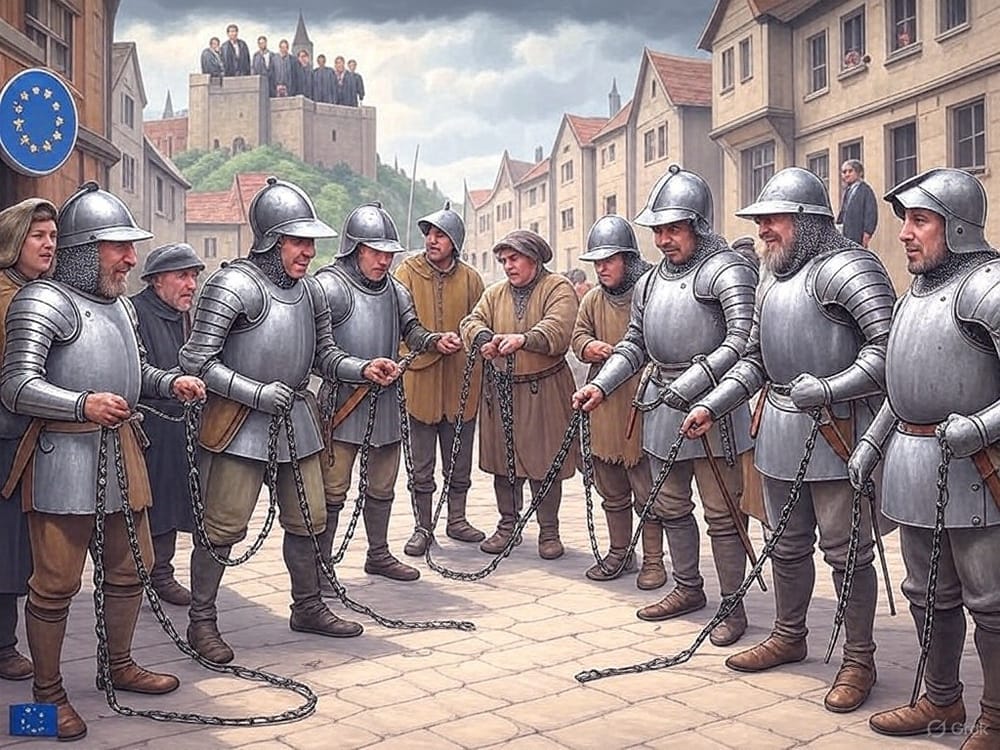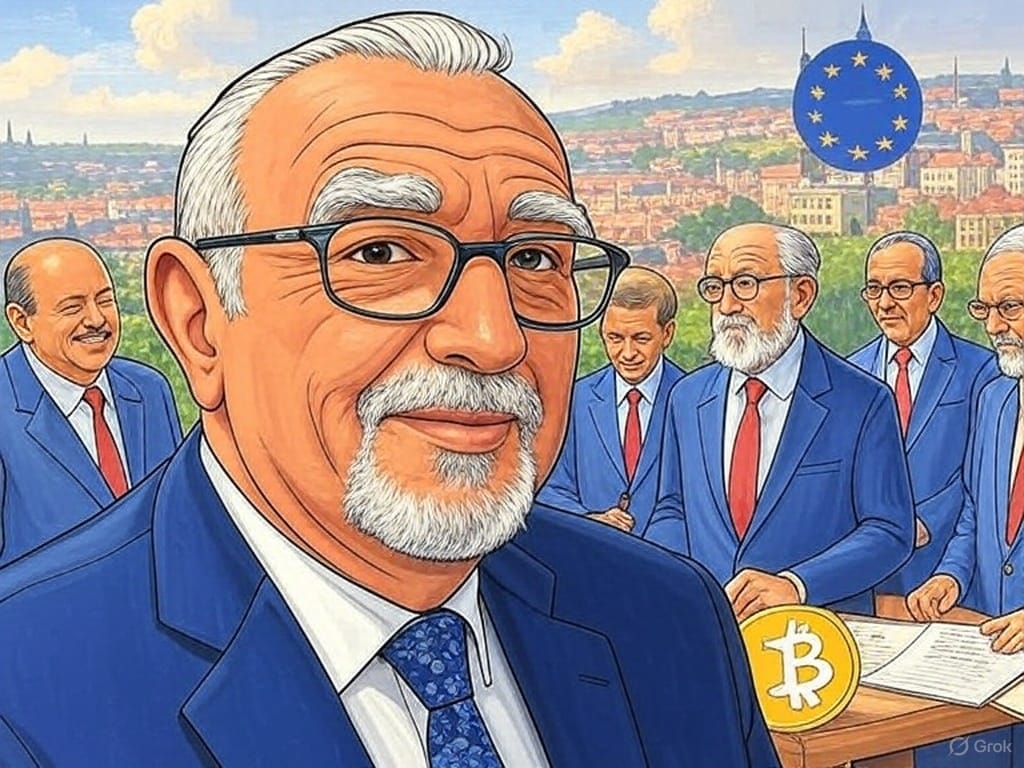Publication/Translation, EN + PL: Şelale Malkoçoğlu | Author/Brought to you by: Slo Hodler | Date: 6/04/2025
Bitcoin was that wild horse—thoroughbred spirit. Think mustang if you will—unbroken, unbridled, bowing to none. A breed no hand could break to saddle. People loved it for its fairness—no backdoor inflation to rob them, no frozen accounts to silence dissent. Its rules were carved in cryptographic stone: 21 million coins, no more, no less. Inflation? At the very sound of that word, Bitcoin laughed in the face of printing machines.
But in the high towers of Brusselsgrad—still looming over many of Sovereignland’s capitals—certain wicked rulers, known as the Bureaucrats, watched Bitcoin with a mix of fear and rage.
"How is it possible we can’t even control this money?!" they shrieked in their secret meetings, sipping coffee from golden cups. "If people use Bitcoin, how will we know what they’re doing, what they’re paying for, or where they need more debt? How do we punish them if we can’t freeze their accounts? And worst of all—how will we fund all our megalomaniac projects if we can’t print more money?"

You see, the Bureaucrats had a dream. The dream of total control. They wanted their own currency—CBDC, short for Cashless Bondage Debt Coupons. It would look like Bitcoin, but with one key difference: they, not the people, would rule over it. Every purchase, every transaction, every cent—all under their watchful eye. "Want to buy coffee? First, we’ll check if you’ve paid all your taxes!" they chuckled. "Criticized our policies? Oops, your account’s done!" With CBDCs, funding another war or golden skyscraper was effortless—just one ‘Print’ click, and poof: money conjured from nothing, out of thin air...
Bitcoin was a thorn in their side. People mined it, traded it, and used it without asking for permission. "This is outrageous!" shouted the Grand Bureaucrat, waving his diamond watch. "If Bitcoin gets any bigger, how will we force people into our CBDC? We have to stop it—now!"

Can You Really Ban Freedom?
So they got to work. First, they smeared Bitcoin as a criminal’s toy. "Only terrorists and drug dealers use this!" they shouted on TV—knowing well most folks just used it to buy coffee or save money. Next came the rules: "Report every Bitcoin transaction or face fines!"—they tried to scare people off. Then they went after mining. "Think of the planet!"—they said, while their private jets burned enough fuel to power a small town.

But the people of Sovereignland weren’t stupid. "They’re building a digital prison!" muttered the crowd in streets, online forums, and encrypted chats. "Bitcoin means freedom. Cashless Bondage Debt Coupons make no sense." Some fought back; others vanished deeper into their sovereign undergrounds, mining, trading, and living on Bitcoin like always.
The Fight Against the Invisible.
The suits in Brusselsgrad knew this war wouldn't end quickly. Bitcoin was smoke - no matter how hard they grabbed at it, their hands came up empty. Yet they persisted. "Fine, if we can't kill Bitcoin, we'll make our CBDC so damn easy people will beg to use it," they concluded after another discussion over their golden mugs.
Free phones loaded with digital cash. Tax credits for early adopters. One-tap payments smoother than any bitcoin wallet. Every trick in the book to herd citizens into their shiny new cage.

And so Sovereignland stood divided: Bitcoin, messy, and unpredictable. Who cares about the freedom if they get CBDC... polished, convenient, controlled for your own safety. The choice seemed obvious, sure, to the bureaucrats. But they underestimated something simple yet powerful. People can tell when you're selling handcuffs and calling them bracelets.
The Battle Grows Fiercer.
As time passed, the topic burned hotter. Bitcoin—still wild, still free—kept charging across the digital frontier, slipping past every the bureaucratic trap. Well, at least until a new twist came to live: shitcoins.
The people called them "fool’s gold" or "get-rich-quick tokens," and like a swarm of glitter-covered flies, they distracted everyone. Suddenly, the air was thick with:
- New taxes (of course)
- IiMF warnings (shocking, we know)
- Sky-high fees (for "your protection")
Craziness! Also, Bitcoin’s true ethos got lost in the noise of pump-and-dump schemes and memecoins. Just like that, the oldest trick of all time is back: "Break their legs… then sell them crutches..."
The Speculation Bubble.
After a while, the entire Sovereignland was overrun with all types of digital coins and weird projects that were more joke than innovation. Names like 'DoggyCoins' and 'MoonRocketX' sounded as ridiculous as they functioned. Yet... Still, greedy or maybe just naive, some people jumped in, hoping to strike the new gold.
The bureaucrats pounced on the chaos. "See? All these coins are dangerous. Bitcoin is a scam!" they barked, waving at the burning wreckage of failed tokens.
The truth? Shitcoins kept dying exactly how they’d lived: what a show... Meanwhile, Bitcoin? Still standing. Growing. Untouched.
But facts didn’t matter. The suits in Brusselsgrad lumped everything together anyway—'for our protection,' of course.
Taxes and Restrictions.
In a small but successful province of Sovereignland—called ‘The Banana Zone’ —2026 brought the newest assault: a 25% tax on crypto profits. "Fairness overall!" announced the Rulers at a press conference, sipping champagne charged to the public ledger. "This whole anarchy and profits for the masses must end today!"
The reality? 'The Banana Zone', once a crypto-friendly hub, began bleeding businesses. Even Bitcoin companies fled, taking hundreds of millions in capital with them. "Bravo, government!" some people were sharing online, their words dripping with sarcasm.
Global Awakening.
Meanwhile, the world was discovering sound money and its values. In places like Nigeriobia, Vietnamiastan, Venezueland, and even Swisslandia, Bitcoin became a lifeline—used for remittances without predatory fees, shielding savings from hyperinflation, and trade where traditional banks failed. Even in USAtan, institutional investors piled into Bitcoin as 'digital gold' when its price surged past $87,000. When El Salvadonia adopted it as legal tender, others took notice.
But the Bureaucrats of Brusselsgrad kept screeching their warnings: "Bitcoin is dangerous! Control is necessary!"
The World's Financial Police.
The IiMF, playing the role of global monetary enforcer, really hated Bitcoin. Whenever a country (like El Salvadonia) tried to embrace it, the IiMF brandished its bureaucratic clipboard. "This destabilizes economies!" they lectured, extorting nations to restrict internal sovereignty and growth in exchange for massive loans—which, to be honest, never helped a single country that took them.
Since an outright ban was impossible (blockchain was unstoppable, like a river breaking dams), they resorted to sabotage—they settled for sneaky revenge. "25% tax on every Bitcoin coffee purchase!" they decreed. The rules, of course, padded their wallets as BTC use withered.

The State That Breaks Legs to Offer a Wheelchair.
The old fable came to life in the cruelest way: The Bureaucrats crippled Sovereignland’s economy with new rules. "No Bitcoin unless we say so!" they ordered, brining more laws.
Eventually, when people could no longer save or trade freely, the Bureaucrats rolled out the ultimate 'solution'—a shiny CBDC. "Your wheelchair, citizens!" they announced. "Use it, but remember—we’ll watch every move. Step out of line? Your money disappears. All for your safety, of course."
The people weren’t fooled. "Why would we trade walking for wheels?" they muttered.
But the Bureaucrats just smirked. "You’ll thank us later," they said. "Bitcoin is chaos! We bring order!" they roared, twisting the screws even tighter.
Truth? Or just a thirst for control? Bitcoin threatened their power, so they tried to tame it—with taxes, laws, empty promises or threats.
Hope Remains.
Yet resistance only got stronger. In encrypted chat rooms and underground forums, Sovereignlanders shared tips and hard-won lessons: "We're not playing by their rules." Soon, people became better and better at decentralized exchanges, peer-to-peer deals, and keeping their Bitcoin completely off the government's radar. Success stories spread—from ordinary people escaping inflation traps to nations rejecting IiMF blackmail.
How Will This Story End?
Will Bitcoin remain free? Or will CBDC become Sovereignland’s only permitted "mobility aid"? That's for the people to choose. But one thing can't be changed: they might break our bones, but they'll never break our spirit.
As long as one computer still mines Bitcoin...
As long as one full node runs...
As long as two people still trade directly...
Bitcoin lives on - and freedom survives.
Any resemblance to actual events? Coincidence. Unless it’s not. Wake up. Open your eyes. Knowledge is the only key. The truth will set you free.
Şelale Malkoçoğlu
Born in Poland, raised in a multi-culti family, I quickly developed a passion for travel & respect for others. The digital nomad lifestyle is my natural fit. For years, I'm a happy Bictoiner as well.
follow me :




Related Posts
Mapping Stats on Bitcoin Professional Frontier
Jan 27, 2026
New Year's greeting 2026: 12k-Basti and the last Fiat illusion
Jan 02, 2026
The plebs who make Bitcoin shine
Dec 28, 2025